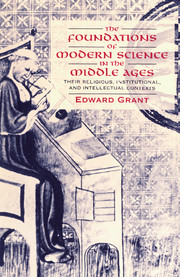 The Foundations of Modern Science in the Middle Ages
The Foundations of Modern Science in the Middle Ages Book contents
- Frontmatter
- Contents
- Preface
- 1 THE ROMAN EMPIRE AND THE FIRST SIX CENTURIES OF CHRISTIANITY
- 2 THE NEW BEGINNING: THE AGE OF TRANSLATION IN THE TWELFTH AND THIRTEENTH CENTURIES
- 3 THE MEDIEVAL UNIVERSITY
- 4 WHAT THE MIDDLE AGES INHERITED FROM ARISTOTLE
- 5 THE RECEPTION AND IMPACT OF ARISTOTELIAN LEARNING AND THE REACTION OF THE CHURCH AND ITS THEOLOGIANS
- 6 WHAT THE MIDDLE AGES DID WITH ITS ARISTOTELIAN LEGACY
- 7 MEDIEVAL NATURAL PHILOSOPHY, ARISTOTELIANS, AND ARISTOTELIANISM
- 8 HOW THE FOUNDATIONS OF EARLY MODERN SCIENCE WERE LAID IN THE MIDDLE AGES
- Notes
- Bibliography
- Index
2 - THE NEW BEGINNING: THE AGE OF TRANSLATION IN THE TWELFTH AND THIRTEENTH CENTURIES
Published online by Cambridge University Press: 05 June 2012
- Frontmatter
- Contents
- Preface
- 1 THE ROMAN EMPIRE AND THE FIRST SIX CENTURIES OF CHRISTIANITY
- 2 THE NEW BEGINNING: THE AGE OF TRANSLATION IN THE TWELFTH AND THIRTEENTH CENTURIES
- 3 THE MEDIEVAL UNIVERSITY
- 4 WHAT THE MIDDLE AGES INHERITED FROM ARISTOTLE
- 5 THE RECEPTION AND IMPACT OF ARISTOTELIAN LEARNING AND THE REACTION OF THE CHURCH AND ITS THEOLOGIANS
- 6 WHAT THE MIDDLE AGES DID WITH ITS ARISTOTELIAN LEGACY
- 7 MEDIEVAL NATURAL PHILOSOPHY, ARISTOTELIANS, AND ARISTOTELIANISM
- 8 HOW THE FOUNDATIONS OF EARLY MODERN SCIENCE WERE LAID IN THE MIDDLE AGES
- Notes
- Bibliography
- Index
Summary
The division of the Roman Empire from the late third century onward into an essentially Greek-speaking eastern part and a Latin-speaking western part had a momentous consequence for intellectual life and therefore for the history of science and natural philosophy. With the passage of time, knowledge of the Greek language in the Western empire became relatively rare. Because Greek had been the language of science, this meant that Greek science was essentially unavailable to those whose sole language was Latin. To become accessible to the Latin-speaking West, a Greek scientific treatise had to be translated into Latin. Few treatises were. Apart from a small number of Hippocratic medical treatises and the few translations made by the likes of Chalcidius and Boethius, almost no significant works of Greek science were translated into Latin. During the ninth and tenth centuries, when the Arabs were translating a large portion of Greek science into Arabic and also adding to this legacy, and during the period when Greek science continued to be read and studied in the Greek-speaking Byzantine Empire, the West had before it only the rudimentary science of the Latin encyclopedists already described in chapter 1. By a.d. 500, knowledge of Greek had become rare and knowledge of the exact sciences even rarer. Except for occasional translations, which sometimes failed to circulate or perished completely, little was added to the now dominant encyclopedic tradition.
- Type
- Chapter
- Information
- The Foundations of Modern Science in the Middle AgesTheir Religious, Institutional and Intellectual Contexts, pp. 18 - 32Publisher: Cambridge University PressPrint publication year: 1996


